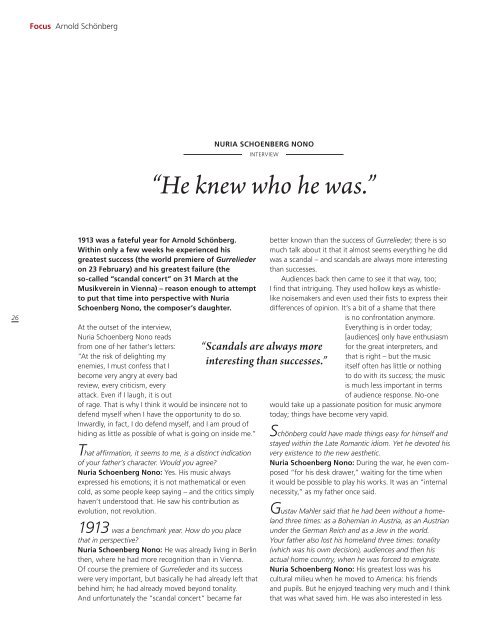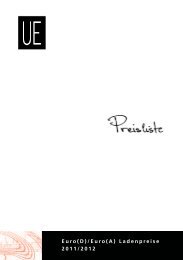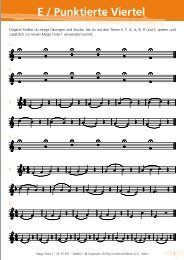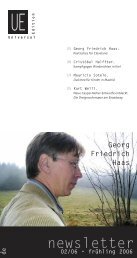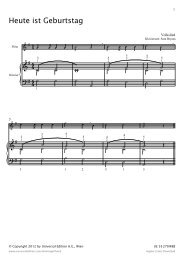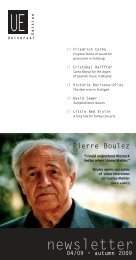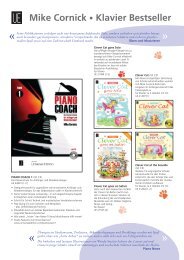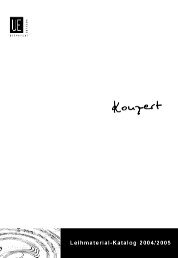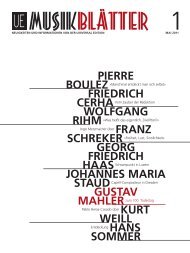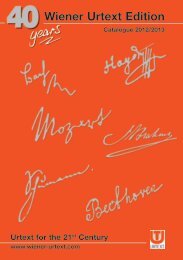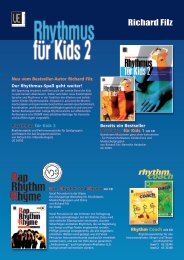Download a PDF file - Universal Edition
Download a PDF file - Universal Edition
Download a PDF file - Universal Edition
Create successful ePaper yourself
Turn your PDF publications into a flip-book with our unique Google optimized e-Paper software.
26<br />
focus Arnold Schönberg<br />
NUria schoeNBerg NoNo<br />
INTERvIEW<br />
“he knew who he was.”<br />
1913 was a fateful year for Arnold Schönberg.<br />
within only a few weeks he experienced his<br />
greatest success (the world premiere of Gurrelieder<br />
on 23 February) and his greatest failure (the<br />
so-called “scandal concert” on 31 March at the<br />
Musikverein in Vienna) – reason enough to attempt<br />
to put that time into perspective with Nuria<br />
schoenberg Nono, the composer’s daughter.<br />
At the outset of the interview,<br />
Nuria Schoenberg Nono reads<br />
from one of her father’s letters:<br />
“At the risk of delighting my<br />
enemies, I must confess that I<br />
become very angry at every bad<br />
review, every criticism, every<br />
attack. Even if I laugh, it is out<br />
of rage. That is why I think it would be insincere not to<br />
defend myself when I have the opportunity to do so.<br />
Inwardly, in fact, I do defend myself, and I am proud of<br />
hiding as little as possible of what is going on inside me.”<br />
That affirmation, it seems to me, is a distinct indication<br />
of your father’s character. Would you agree?<br />
Nuria Schoenberg Nono: yes. His music always<br />
expressed his emotions; it is not mathematical or even<br />
cold, as some people keep saying – and the critics simply<br />
haven’t understood that. He saw his contribution as<br />
evolution, not revolution.<br />
1913 was a benchmark year. How do you place<br />
that in perspective?<br />
Nuria Schoenberg Nono: He was already living in Berlin<br />
then, where he had more recognition than in vienna.<br />
of course the premiere of Gurrelieder and its success<br />
were very important, but basically he had already left that<br />
behind him; he had already moved beyond tonality.<br />
And unfortunately the “scandal concert” became far<br />
“ Scandals are always more<br />
interesting than successes.”<br />
better known than the success of Gurrelieder; there is so<br />
much talk about it that it almost seems everything he did<br />
was a scandal – and scandals are always more interesting<br />
than successes.<br />
Audiences back then came to see it that way, too;<br />
I find that intriguing. They used hollow keys as whistlelike<br />
noisemakers and even used their fists to express their<br />
differences of opinion. It’s a bit of a shame that there<br />
is no confrontation anymore.<br />
Everything is in order today;<br />
[audiences] only have enthusiasm<br />
for the great interpreters, and<br />
that is right – but the music<br />
itself often has little or nothing<br />
to do with its success; the music<br />
is much less important in terms<br />
of audience response. No-one<br />
would take up a passionate position for music anymore<br />
today; things have become very vapid.<br />
Schönberg could have made things easy for himself and<br />
stayed within the Late Romantic idiom. Yet he devoted his<br />
very existence to the new aesthetic.<br />
Nuria Schoenberg Nono: During the war, he even composed<br />
“for his desk drawer,” waiting for the time when<br />
it would be possible to play his works. It was an “internal<br />
necessity,” as my father once said.<br />
Gustav Mahler said that he had been without a homeland<br />
three times: as a Bohemian in Austria, as an Austrian<br />
under the German Reich and as a Jew in the world.<br />
Your father also lost his homeland three times: tonality<br />
(which was his own decision), audiences and then his<br />
actual home country, when he was forced to emigrate.<br />
Nuria Schoenberg Nono: His greatest loss was his<br />
cultural milieu when he moved to America: his friends<br />
and pupils. But he enjoyed teaching very much and I think<br />
that was what saved him. He was also interested in less


